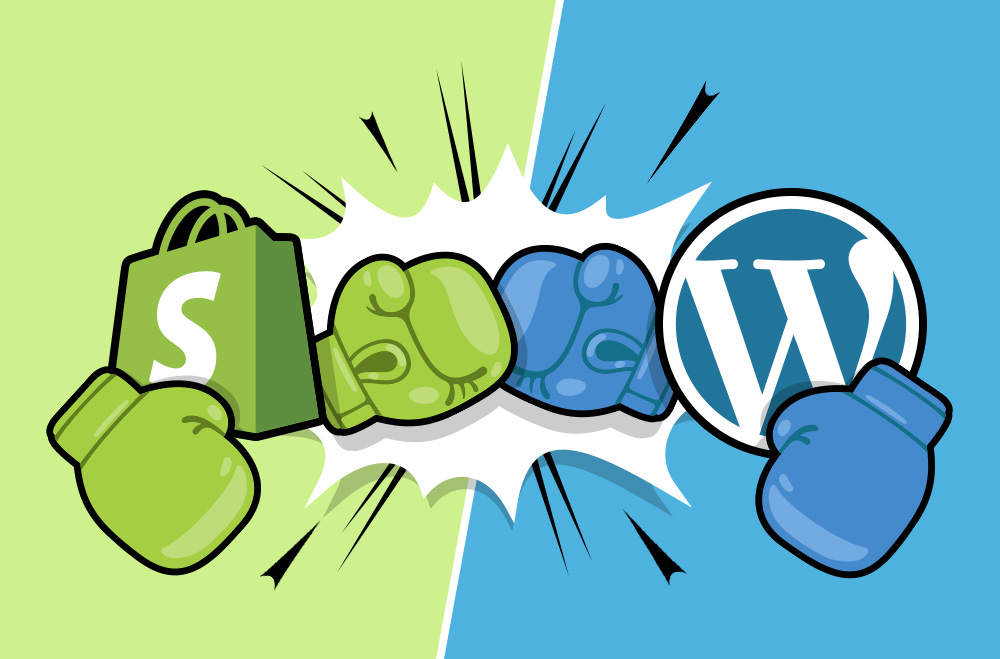


If you're building a website or launching an online store, selecting the right platform is crucial for your site's visibility on Google. Your platform impacts everything from site speed and mobile optimization to how easily search engines can crawl and index your content. Shopify and WordPress are two of the most popular choices, each offering powerful tools and distinct approaches to SEO. This article will explore how these platforms compare in key SEO areas, helping you decide which is better suited for improving your rankings and driving long-term organic traffic to your site.
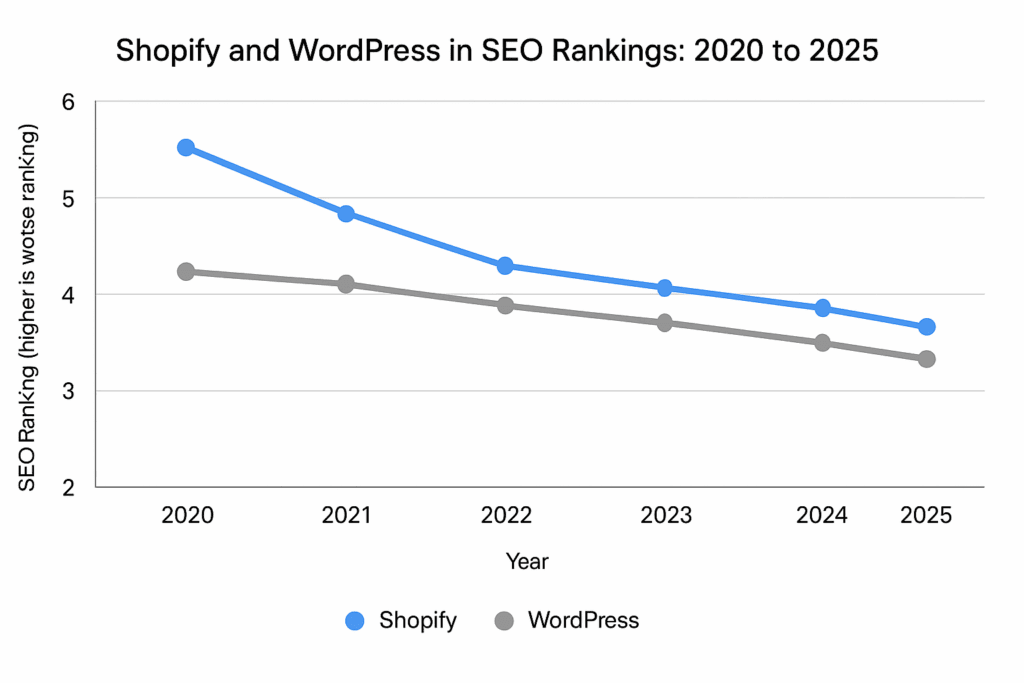
Shopify and WordPress are the most popular platforms for building websites and online stores. Shopify is an e-commerce-focused platform designed for businesses to sell products online. At the same time, WordPress is a versatile content management system (CMS) used to build a wide variety of websites, including blogs, business sites, and online stores (via plugins like WooCommerce).
Both platforms have distinct strengths and weaknesses regarding SEO (search engine optimization). Comparing their SEO capabilities is essential for business owners who want to optimize their sites for better rankings on search engines like Google.
Shopify is built with e-commerce efficiency and ease-of-use in mind, and that extends to its out-of-the-box SEO capabilities. Shopify automates many core SEO tasks for beginners or store owners who want a hassle-free setup. It generates SEO-friendly URLs, auto-fills meta titles and descriptions based on product and page content, and creates XML sitemaps automatically for better search engine indexing. These default settings ensure that even without technical SEO knowledge, store owners can launch with a site that follows essential optimization standards.
In addition to automation, Shopify provides built-in tools to enhance visibility and ranking potential. All Shopify themes are mobile-responsive, which helps your site perform well in Google's mobile-first indexing. Page speed is optimized through Shopify’s fast hosting infrastructure, and every store comes with a free SSL certificate, boosting security and user trust. Shopify also includes clean HTML structure and basic schema markup (structured data), helping search engines better understand your product pages and site layout. While it may not offer the complete flexibility of WordPress, Shopify’s SEO features cover most of the fundamental needs for growing an online store organically.
Key SEO Features Shopify Offers:
WordPress is widely recognized for its SEO flexibility and customization capabilities, making it a top choice for businesses prioritizing organic search visibility. Unlike closed systems, WordPress gives users complete control over their SEO strategy. From adjusting page titles to editing meta descriptions and customizing permalinks, WordPress allows granular optimization of every content element. With robust SEO plugins like Yoast SEO or Rank Math, users can audit content, manage sitemaps, optimize for keywords, and preview how their posts appear in search results.
Another strength of WordPress lies in its ability to scale and adapt to advanced SEO strategies. With plugins for schema markup, breadcrumbs, and custom redirects, site owners can implement complex techniques that improve how content is indexed and displayed in SERPs (Search Engine Results Pages). Its open-source nature means you can enhance site performance, use advanced caching tools, and optimize image delivery using CDNs. WordPress offers powerful tools for long-term search engine growth, whether you're running a blog, a business site, or an online store via WooCommerce.
Key SEO Features WordPress Offers:
When choosing the best platform for e-commerce SEO, both Shopify and WordPress (with WooCommerce) offer substantial advantages but cater to different types of users. Shopify is tailored for merchants who want a quick, streamlined setup with minimal configuration. It's built-in SEO features automatically handle the basics, making it ideal for users with limited technical knowledge. Shopify generates clean URLs, includes meta tags, and ensures fast page speed by default, helping product pages index quickly and rank efficiently.
On the other hand, WordPress with WooCommerce is better suited for businesses that require greater SEO flexibility and control. If you're comfortable working with plugins and customizing settings, WordPress gives you more opportunities to fine-tune your SEO strategy. You can install advanced plugins like Rank Math or Yoast SEO, manage schema markup, customize breadcrumbs, and build a detailed internal linking structure. This level of control can lead to more effective long-term SEO results for large stores or businesses with specific content goals.
Shopify’s SEO for E-commerce:
WordPress SEO Flexibility with WooCommerce:
Shopify offers several built-in SEO advantages, making it an excellent choice for e-commerce businesses that want to launch quickly and rank well on search engines. It simplifies technical SEO by automating essential elements like URL structure, meta tags, sitemaps, and redirects. This allows users, even those with limited technical knowledge, to focus on product creation and marketing, rather than manually configuring SEO elements. Shopify also ensures clean, structured code and includes schema markup to help search engines understand and categorize your product pages.
Another key advantage is Shopify’s focus on speed and security, both major ranking factors in Google’s algorithm. The platform is hosted on fast, secure servers and includes a free SSL certificate for every store, helping build trust with users and search engines. Mobile responsiveness is standard with all Shopify themes, ensuring your store is optimized for mobile-first indexing. While it may lack the deep customization options of WordPress, Shopify’s SEO features cover the needs of most online retailers out of the box.
Key SEO Advantages of Shopify:
WordPress is widely regarded as one of the most SEO-flexible platforms available today. Its open-source nature gives users complete control over every on-page SEO element, from meta titles and descriptions to image alt tags and custom permalinks. This level of access is ideal for website owners who want to optimize their pages for particular search intent. Additionally, WordPress allows for fine-tuned keyword targeting and custom schema implementation, enabling better alignment with evolving search engine algorithms and structured data requirements.
What truly sets WordPress apart is its plugin ecosystem. Tools like Yoast SEO, All in One SEO, and Rank Math offer advanced capabilities such as content analysis, internal linking suggestions, dynamic XML sitemap generation, and social metadata integration. WordPress also excels in content-driven SEO strategies, allowing you to create detailed blogs, landing pages, and media-rich content to support long-tail keyword campaigns. This makes it the platform for businesses looking to drive sustainable organic growth through content marketing and deep SEO customization.
Key SEO Advantages of WordPress:
In today’s digital landscape, mobile-first indexing is no longer optional; it’s a core part of Google’s ranking algorithm. Websites are now primarily ranked based on mobile performance, not desktop versions. Shopify offers a decisive advantage here because all its themes are mobile-responsive by default. Your store automatically adjusts to fit smartphones and tablets without additional customization. With Shopify’s fast, secure hosting, the platform delivers a seamless mobile experience that positively influences user engagement and SEO rankings.
WordPress also supports mobile optimization, but places more responsibility on the site owner. The platform offers a wide range of themes, but not all are mobile-optimized out of the box. Achieving great mobile SEO on WordPress often requires choosing a well-coded theme and adding plugins or manual optimizations to improve speed, navigation, and responsiveness. While this flexibility allows for more customization, it also means additional setup time and testing to ensure the mobile experience aligns with SEO best practices.
Shopify and Mobile Optimization:
WordPress and Mobile Optimization:
Speed and performance are essential for SEO, as Google uses page load time and site responsiveness as ranking factors, especially for mobile users. Shopify has the upper hand in this area out of the box. Since it’s a fully hosted platform, Shopify handles server optimization, caching, and content delivery without user intervention. This ensures consistently fast load times for product and collection pages, even during high traffic periods, which helps reduce bounce rates and improve rankings.
WordPress, in contrast, offers flexibility at the cost of simplicity. WordPress websites rely on third-party hosting providers, meaning speed and performance vary widely depending on server quality, theme optimization, and plugin usage. However, with the correct configuration, such as a high-quality hosting plan, caching plugins like W3 Total Cache, image optimization tools like Smush, and a CDN, WordPress can match or even exceed Shopify’s performance. The difference is that achieving top performance on WordPress usually requires more technical effort.
Shopify’s Speed and Performance Highlights:
WordPress Speed and Performance Considerations:
SEO flexibility refers to the level of control you have over how your website is optimized for search engines. In this area, WordPress stands out due to its open-source structure and vast plugin ecosystem. Users can modify almost every part of their site’s SEO, from URL slugs to meta tags, structured data, canonical links, and advanced sitemap settings. This freedom makes WordPress ideal for developers and SEO professionals who want to implement custom strategies and experiment with advanced on-page techniques.
While user-friendly and efficient for e-commerce, Shopify offers more limited SEO flexibility. It automates many SEO basics, which is excellent for beginners but may be restrictive for advanced users. Customizing technical SEO elements like URL structure, schema markup, or robots.txt is harder to achieve in Shopify without using third-party apps or custom development. While Shopify’s app marketplace does offer SEO-enhancing tools, these are not as comprehensive or customizable as the plugins available on WordPress.
Shopify SEO Flexibility:
WordPress SEO Flexibility:
Choosing between Shopify and WordPress for SEO ultimately comes down to your business needs, technical skill level, and long-term goals. Shopify is best suited for e-commerce businesses prioritizing ease of use, fast setup, and built-in performance features. It’s a turnkey solution with automatic SEO tools, ideal for entrepreneurs or small teams that want to focus on running their store rather than managing complex technical settings. Its fast loading times, responsive themes, and structured data make it a strong contender for those who want out-of-the-box SEO readiness.
On the other hand, WordPress is the better option for users who require complete SEO control and customization. It's perfect for businesses that depend heavily on content marketing, need advanced keyword targeting, or want to optimize for long-tail search strategies. With the right plugins, WordPress can become an SEO powerhouse, offering capabilities beyond what Shopify can do natively. However, this comes with a steeper learning curve and more maintenance and performance optimization responsibility.
Choose Shopify if you want:
Choose WordPress if you need:
If you're leaning toward WordPress for its SEO flexibility, having the right plugins can dramatically enhance your website's performance in search engine rankings. Below are ten powerful SEO plugins that help you efficiently optimize content, metadata, links, and performance.
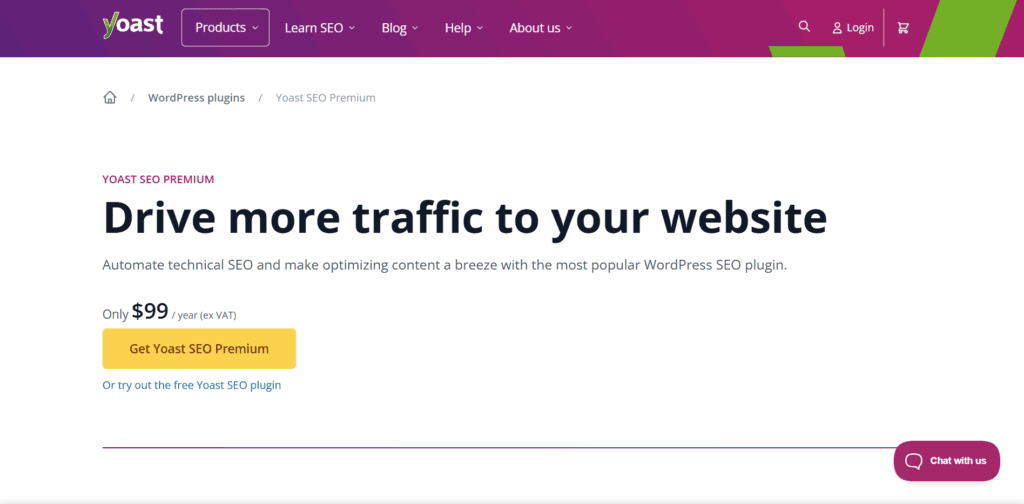
Yoast SEO is a beginner-friendly plugin that helps users optimize metadata, readability, and keyword usage. It provides real-time content analysis and SERP previews to ensure your content is search engine-ready.
Features:
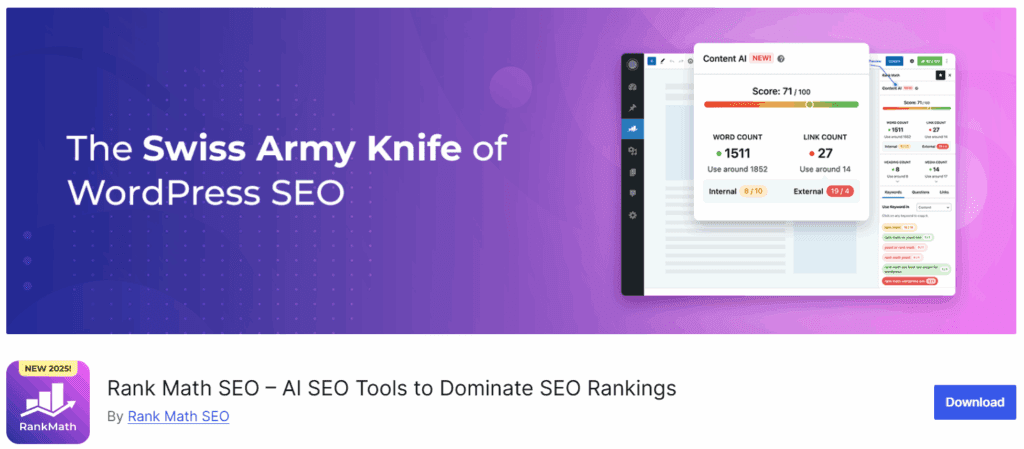
Rank Math offers comprehensive SEO tools, including rich snippet support, keyword tracking, and built-in schema integration. It's lightweight and modular, making it ideal for beginners and experts.
Features:
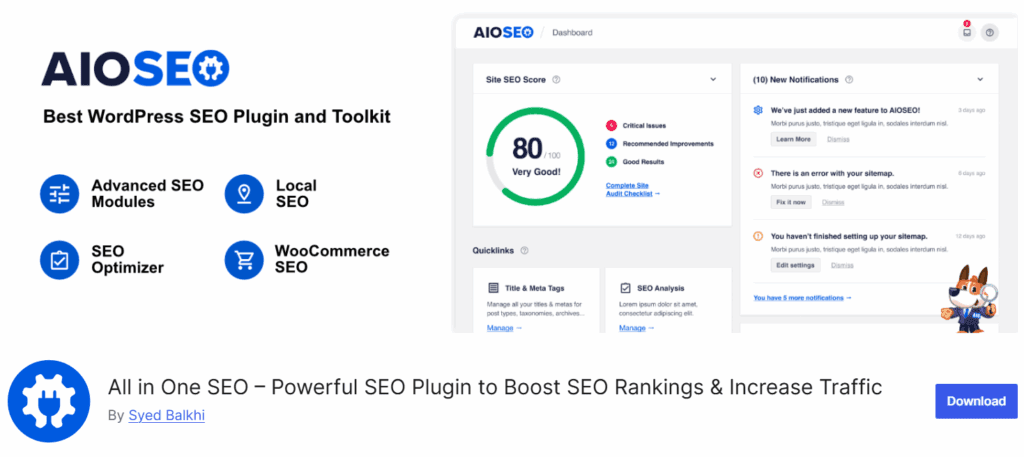
AIOSEO is a powerful plugin for users seeking hands-off SEO automation. It offers a clean dashboard, local SEO support, and WooCommerce compatibility, perfect for stores and blogs.
Features:
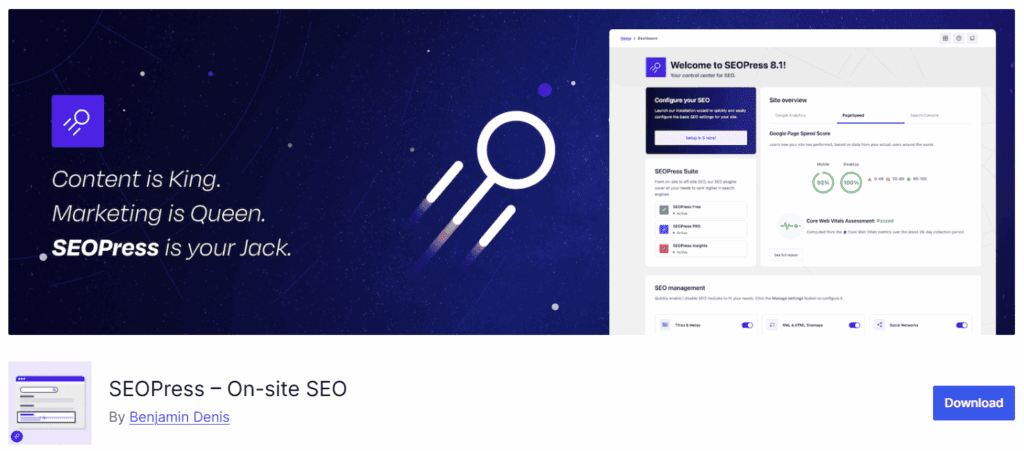
SEOPress is a white-label SEO plugin built for professionals. It offers excellent metadata control, Google Analytics integration, and unlimited keywords without ads.
Features:
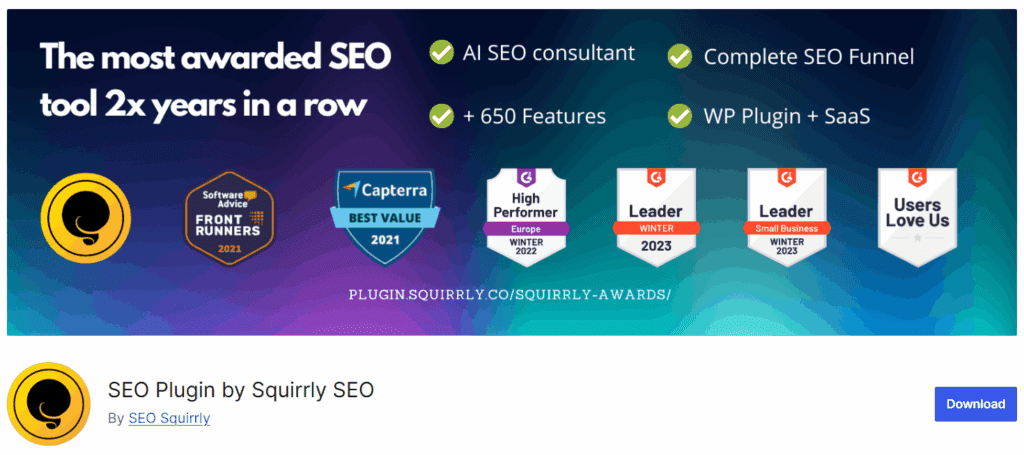
Squirrly SEO uses AI and real-time optimization to guide users toward better search rankings. It’s beneficial for content creators and bloggers needing continuous SEO suggestions.
Features:
Shopify’s app ecosystem empowers store owners to enhance SEO beyond its built-in features. These apps provide powerful tools to automate optimization, manage metadata, improve speed, and structure content for search engines, which are essential for gaining visibility and improving organic rankings.
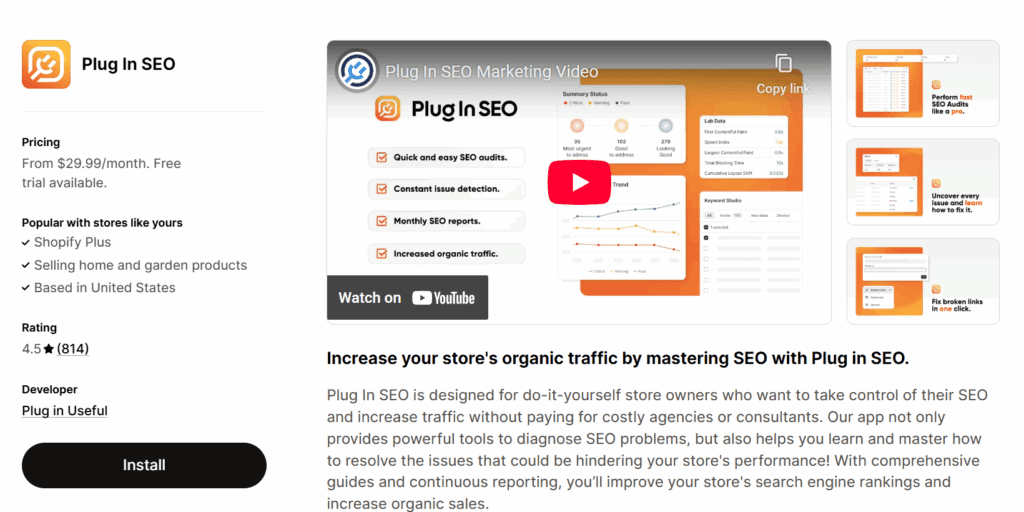
Plug In SEO automatically checks your Shopify store for SEO issues and helps you fix them. It’s beginner-friendly, offering clear instructions and automated optimization for titles, descriptions, and more.
Features:
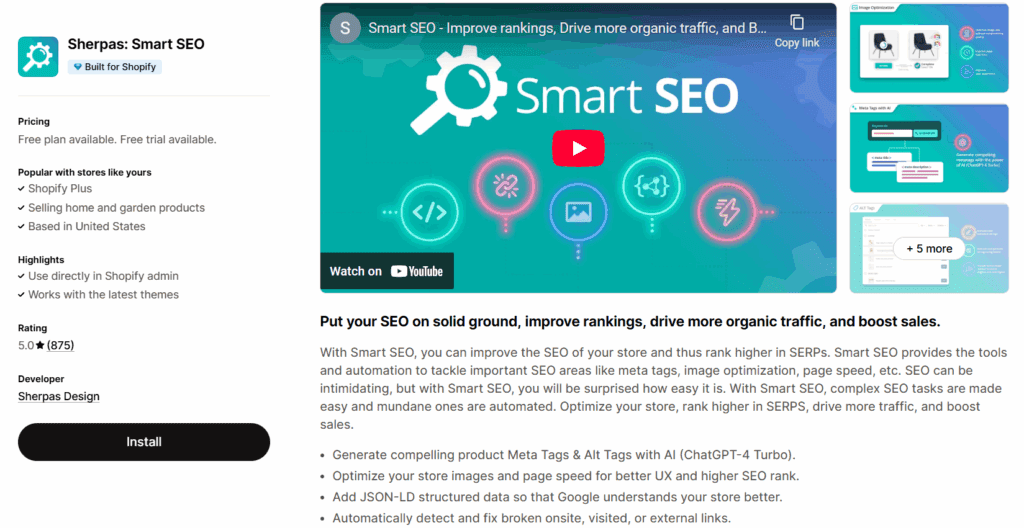
Smart SEO automates meta tags and alt tags across your store and builds structured data to improve your visibility in search engines.
Features:
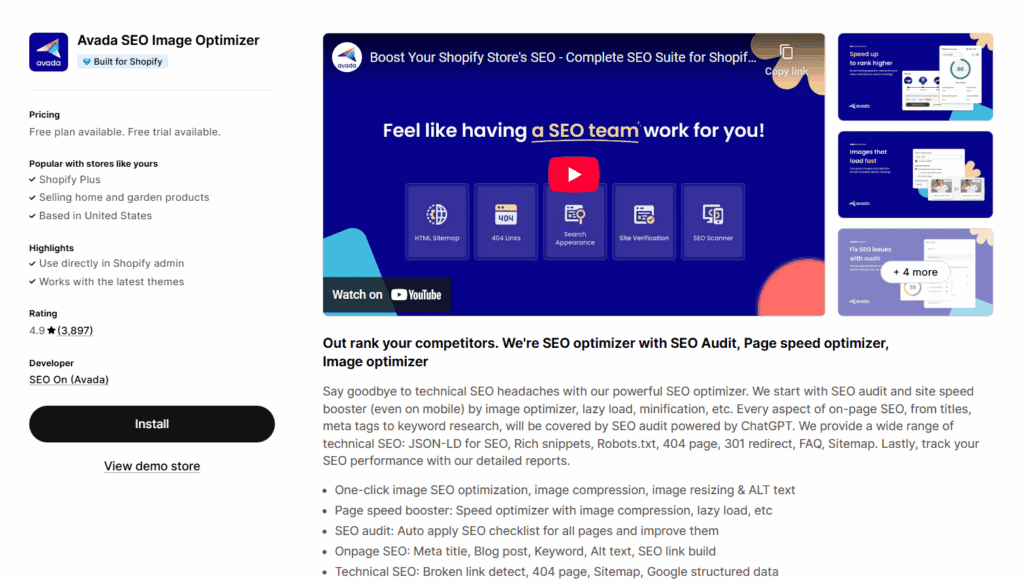
Avada’s all-in-one SEO toolkit helps optimize every aspect of SEO from images to meta tags and includes real-time analytics.
Features:
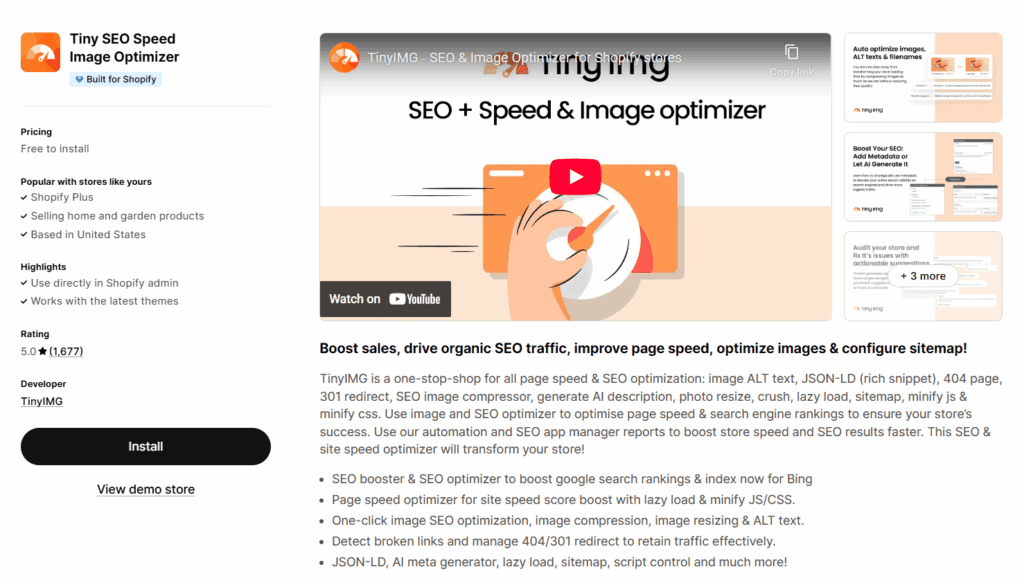
TinyIMG enhances your SEO by compressing images without losing quality and automatically adding alt texts.
Features:
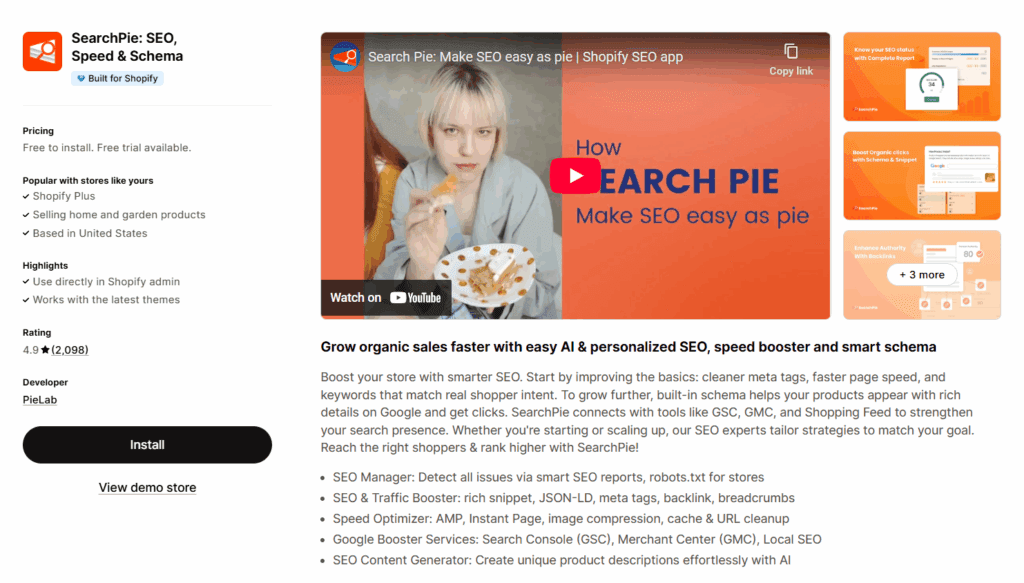
Booster SEO automates everything from image alt tags to meta descriptions, offering fast setup and hands-free performance improvements.
Features:
Setting up a Shopify store is a significant first step, but ensuring it performs well in search engine rankings requires more than just the basics. Shopify’s built-in SEO features provide a solid foundation. Still, to truly compete, especially in crowded e-commerce markets, you’ll need a strategy tailored to your industry, audience, and product offerings. That’s where professional Shopify SEO support becomes invaluable. Experts can help you address technical SEO issues, refine your keyword targeting, and optimize your store for Google’s evolving algorithms.
By working with a Shopify development and SEO team, you’ll gain access to proven tactics that improve visibility, drive traffic, and increase conversions. Professional support ensures your store is functional and competitive, from optimizing product descriptions and metadata to implementing structured data and improving page load speed. Whether launching a new site or enhancing an existing one, having an expert can accelerate your growth and reduce costly trial and error.
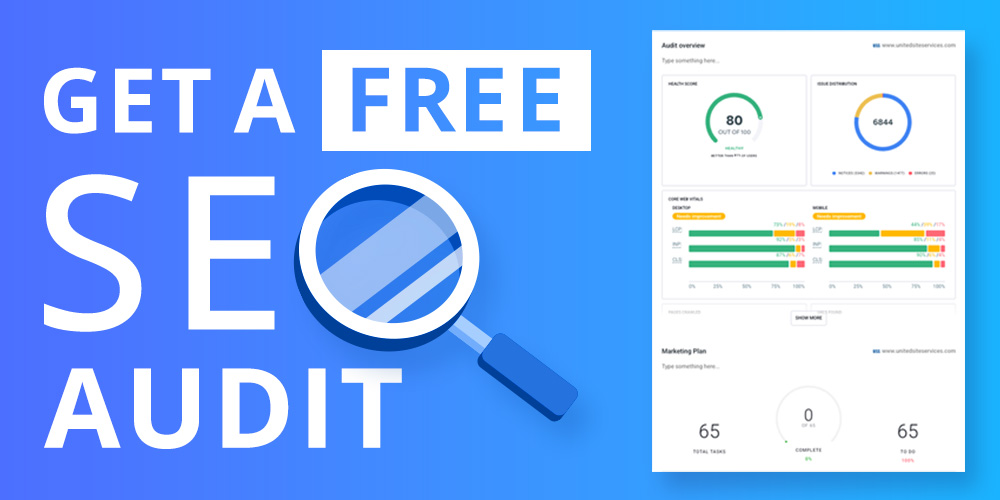
"*" indicates required fields

"*" indicates required fields

"*" indicates required fields